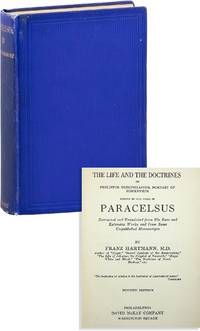first edition
1943 · New York
by [GREAT DEPRESSION] [AMERICAN FOLK MUSIC] GUTHRIE, Woody; Billy Bragg
New York: E.P. Dutton & Co, 1943. First Edition. First Printing. Inscribed on the half-title by English musician and songwriter Billy Bragg: "Woody Guthrie lies exactly between Walt Whitman & Bob Dylan. As he said: Take it easy, but take it," signed, dated 2012; the recipient is unspecified. Octavo (22cm); black cloth, with titling and decorations stamped in gilt on spine and front panel; yellow topstain; dustjacket; [4],5-428pp, with a frontispiece portrait of Guthrie, and black & white illustrations by him throughout the text. Top-stain faded; soiling to cloth and endpapers; earlier ink ownership signature to front free endpaper; no better than Very Good. In original but somewhat worn dustwrapper, slightly trimmed along bottom edge with a few old cello-tape adhesions and a ca. 1" loss at base of spine panel; just Very Good.
Stephen William "Billy" Bragg, born in 1957, pioneered and came to embody the genre broadly known as "folk-punk," delivering songs of working-class experience in a voice authentic enough that it woke the political consciousness of a lost generation. For many who came of age during the desolate days (well, they seemed desolate at the time, but Jesus look at us now) of what is now referred to by this cataloguer as The Great Reagan-Thatcher Darkness, Bragg gets credit for breaking through the fog of apathy to reveal that, behold, real commitment to concepts like justice and equity might actually be cool. He was in fact our generation's Woody Guthrie – a mantle he would have had a right to claim even without Mermaid Avenue, his landmark collaboration with American rock group Wilco, which brought to life several dozen lost (or, at least, never-recorded) Guthrie lyrics. Issued in three parts over a five-year period, Mermaid Avenue forever formalized the Bragg-Guthrie pedigree. That Woody's daughter Nora had sought Bragg out specially for that project is testament in itself to the lineage that this copy of Guthrie's autobiography now embodies.
Far from the prettiest copy we've handled – a bit punked-up, to be honest – but none the less a talismanic copy of what is perhaps the greatest of American Dustbowl narratives, now recognized as a signal work of mid-20th century Americana, an enduring classic which holds a place in the American Depression-era canon beside the work of Steinbeck and Dos Passos. REUSS 34. (Inventory #: 84694)
Stephen William "Billy" Bragg, born in 1957, pioneered and came to embody the genre broadly known as "folk-punk," delivering songs of working-class experience in a voice authentic enough that it woke the political consciousness of a lost generation. For many who came of age during the desolate days (well, they seemed desolate at the time, but Jesus look at us now) of what is now referred to by this cataloguer as The Great Reagan-Thatcher Darkness, Bragg gets credit for breaking through the fog of apathy to reveal that, behold, real commitment to concepts like justice and equity might actually be cool. He was in fact our generation's Woody Guthrie – a mantle he would have had a right to claim even without Mermaid Avenue, his landmark collaboration with American rock group Wilco, which brought to life several dozen lost (or, at least, never-recorded) Guthrie lyrics. Issued in three parts over a five-year period, Mermaid Avenue forever formalized the Bragg-Guthrie pedigree. That Woody's daughter Nora had sought Bragg out specially for that project is testament in itself to the lineage that this copy of Guthrie's autobiography now embodies.
Far from the prettiest copy we've handled – a bit punked-up, to be honest – but none the less a talismanic copy of what is perhaps the greatest of American Dustbowl narratives, now recognized as a signal work of mid-20th century Americana, an enduring classic which holds a place in the American Depression-era canon beside the work of Steinbeck and Dos Passos. REUSS 34. (Inventory #: 84694)



![Serendipities: Language and Lunacy [Signed]](https://d3525k1ryd2155.cloudfront.net/h/908/428/1693428908.0.m.jpg)